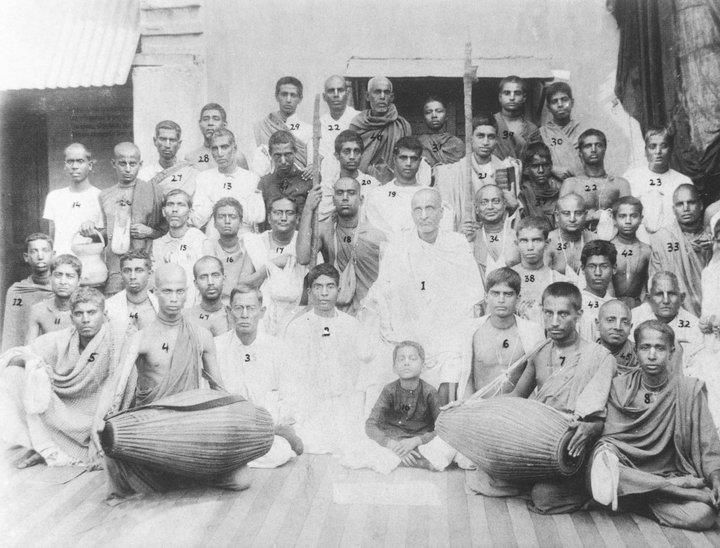Prati-sambhāṣaṇa - A Response to Disciples

(Written on the occasion of his Vyāsa-pūjā in 1924, in humble response to the effusive offerings of his disciples. Originally published in the weekly Gauḍīya (2nd Vol., 28th Issue – March 1, 1924)
My dear friends, delivering me from catastrophe (vipada-uddhāraṇa-bāndhava-gaṇa),
Before saying anything, I am, as per the tradition of the śrauta-patha (the path of what has been heard in disciplic succession), offering obeisance with all eight bodily limbs, like a stick, to my Śrī Gurudeva, who is a manifestation inconceivably identical to and different from Śrī Viṣṇu and the Vaiṣṇavas.
My Śrī Gurudeva is the manifester of pastimes as the āśraya-jātīya viṣṇu-vigraha (the omnipresent form of Viṣṇu as repository and agent of prema). Though he is the form of Viṣṇu that is beloved to Bhagavān (bhagavat-priyatama viṣṇu-vigraha), in the form of the Vaiṣṇava, he is situated in this material realm within all living entities for the purpose of elevating fallen wretches such as myself. In nara (human) form, which rules as the king of all living creatures, he is my sole object of worship (upāsya-vastu). Though as narottama (topmost of humans), he is a Vaiṣṇava, or the servant of the supremely cherished object of all Vaiṣṇavas, he is a tattva (principle, truth) that is inconceivably one with and different from Śrī Gaurasundara.
From the perspective of non-difference, he is the embodiment of the pinnacle of all that is worshipful (upāsya-pārākāṣṭha-tanu). The visible world is occupied (vyasta) in his service, yet nara (humans) such as myself who are opposed to service are content to desist (nirasta) at simply referring to him as narottama. The devotees of that narottama are the nara-gaṇa (human multitude) of Vaiṣṇavas, and therefore, they themselves are manifest as my guru in many personified forms (bahu-mūrti).
In the anvaya-bhāva (positive, concordant state of reality), they indeed are my guru-varga (all my gurus) and my teachers. In the vyatireka-bhāva (negative, discordant state), in a phase of time that is conducive for their bhajana, somehow or other it is they who are preoccupied with hearing the rambling utterances of such a wretched human (narādhama) as myself. I believe that it is in their company alone that I am capable of performing kīrtana in a single, unified fashion, altogether, of the divine message I have heard from Śrī Gurudeva.
I do not have the audacity to give any instruction to the world. Why? Because the tattva (principle) of Viṣṇu and the Vaiṣṇavas is eternally unique (nitya-vaiśiṣṭa). In other words, though They are eternally possessed of mutual differences, They are, in an inconceivable manner, identical. I have heard from Śrī Gurudeva that all upāsya (worshipful deities), all categories and classes of upāsakas (worshippers), and all types of upāsana (worship) are, within the non-dual Absolute Truth (advaya-jñāna), Vrajendra-nandana, the son of the king of Vraja, eternally embraced or united (nitya-saṁśliṣṭa)—yet, at the same time, though they are nitya-saṁśliṣṭa, they are eternally endowed with a variegated range of playful expression (vicitra-vilāsa-yukta) that results from the state of their manifestation (prākaṭya).
Said nitya-līlā (those eternal pastimes) endowed with variegated playful expressions are what has been forgotten by me and other jīva entities like me who are averse to Hari, guru, and Vaiṣṇavas. And because of that, we have become bhraṣṭa (gone astray) from that nitya-satya, that eternal truth. What is more, I cannot lift myself up enough to even understand properly just how far gone astray I am.
In my eternal awareness (nitya-bodha), I am Kṛṣṇa’s servant. Having forgotten my eternal servitude, I have fallen into the well of a whirlpool when it comes to gaining some experience of my own true form and nature. In the course of such a plummet, my experience of taṭastha-śakti enters a state of slumber. I then experience aversion to the service of the omnipotent Absolute Truth, Vrajendra-nandana, as my supreme accomplishment. Because that attitude contradicts the eternal, transcendental variegation of playful expressions (nitya-cinmaya-vilāsa-vicitratā), I mistake māyāvāda (impersonal monism) for brahma-jñāna (knowledge of the Supreme Being)! That manner of philosophy propels me down an ill-considered path and is depriving me for all time of Śrī Gurudeva’s eternal servitude. That is why I am failing to understand bhedābheda-prakāśa (the manifestation of simultaneous oneness and difference) in my own existence. The three Vedic mantras beginning with “dvā suparṇā – two birds…” are not becoming the subject of my kīrtana!
Where bhedābheda-prakāśa is unmanifest in my amnesia of my svarūpa is precisely where I am making an offense at the worshipful feet of Śrīdhara Svāmipāda, who is non-different from the sole protector of bhakti, Śrī Viṣṇu Svāmipāda. Mistaking the conceptions of śuddhādvaita (purified monism) with kevalādvaita-vāda, I am being deprived of tasks of service dear to my Prāṇa-vallabha (who is the beloved of my very life airs). Cheated of following Śrī Vyāsa’s guidance, I become bereft of bhakti-siddhānta (the proper conclusions of bhakti) and invite avidyā (ignorance), and it is thereby that I find myself to be a mundane enjoyer and deliberator bewildered by arrogance who is giving up the śrauta-patha (the path of what I have heard from śrī guru). That is precisely why I am becoming avaidika (non-Vedic) and giving more regard to the considerations of karma, thereby committing offences at the feet of the Vaiṣṇavas.
I am coming to understand that the Pañcarātra paddhati (formulary) spoken by Śrī Nārāyaṇa is at odds with the śrauta-karma-paddhati (the traditions of karma-kāṇḍa as received via hearing, i.e. the Vedas). By seeing the worshipful deities Saṅkarṣaṇa, Pradyumna, and Aniruddha as different from the Vāsudeva and His tattva, I am reaping inauspiciousness for myself. As I make offences at the feet of Śāṇḍilya, my perception of kevalādvaita (extreme monism) is becoming stronger.
The much-needed aid that Śrī Pūrṇa-prajña Ṛṣi Ānanda-tīrtha Madhva-muni extends to me during these dark days by manifesting his servitude to Vyāsa is something I am truly incapable of expressing in the language of this material world. The sincere efforts of bhajana made by Śrī Mādhavendra Purīpāda out of devotion for that worshipful object—which were preserved and safeguarded in the heart of Śrī Īśvara Purīpāda—are precisely what Śrī Gaurasundara distributed among His intimate associates without reservation.
Śrī Rūpa was he who expanded and spread that prema and following in his guidance is the personification of loving attachment of or for bhajana (bhajana-rati-vigraha), Śrī Dāsa Gosvāmi Prabhu. Becoming averse to the service of his lotus feet, I have become averse to Hari. Śrī Jīva-pāda, following the cue of Śrī Sanātana Gosvāmī, has grabbed me by the hair and firmly established me as the eternal servant of the lotus feet of Raghunātha-Svarūpa. Gaining the great good fortune of hearing the words issuing forth from the worshipful hands of Śrī Kavirāja Gosvāmī, I gain the opportunity to see my Śrī Gurudeva as Śrī Narottama Pādapadma. I am an insignificant jīva of this viśva (vast world). The master of that viśva, Śrī Viśvanātha Prabhu, has invoked so many Vyāsa-pūjās in order to deliver me from a wayward trajectory.
In times of peril, Vedāntācārya [Śrī Baladeva Vidyābhūṣaṇa], who infuses strength into Śrī Madhusūdana Dāsa and Śrī Uddhava Dāsa, manifests as śrī guru and delivers me from the harrowing danger of the tarka-panthā (path of empirical logic) and reveals nyāya (the Vedic school of logic). That same āśraya-jātīya form of guru as Śrī Bhaktivinoda has, by his writings, personal conduct, and other forms of service to Viṣṇu, become the personification of Kṛṣṇa Dvāipāyana and given me shelter at the innermost region of Vraja-bhūmi Navadvīpa, at Śrī Vraja Pattana. Knowing that I will fall down (patana) if I succumb to the materialistic knowledge of this realm of indulgence and dash about in external pursuit of darśana of that splendour of Vraja-bhūmi, that form of Śrī Gaurakiśora that has bathed me in the dust of his feet. Adorned with the footdust of that transcendental embodiment, today I have the audacity to introduce myself in the language of Śrī Caritāmṛta:
purīṣera kīta haite mui se laghiṣṭha |
jagāi mādhāi haite mui se pāpiṣṭha ||
morā nāma jei kare tāra puṇya-kṣaya |
mora nāma jei laya tāra pāpa haya ||
emana nirghṛṇya more kebā dayā kare |
eka nityānanda binā jagat mājhāre ||
That saviour of the fallen, a veritable wish-fulfilling tree, the most magnanimous Nityānanda-vigraha is protecting me in all respects from becoming averse to Hari. All of you Vaiṣṇavas are His vilāsa-vigraha vaibhava-prakāśa (the manifestation of the opulence of that personification of pastimes). I offer millions upon millions of daṇḍavat-praṇāma obeisances at your feet. You are my dearest friends, my only saviours in times of adversity.
As I am just another creature of this visible, fleeting realm born of the three modes of material nature, I am harbouring aversion to Kṛṣṇa in my body, mind, and words. I beseech you to take up that tridaṇḍa of mine, which is a most suitable tool for punishment, and correct my tendency to enjoy that which is meant for Kṛṣṇa. In the external world, you are all Vaiṣṇava Paramahaṁsas. Please have mercy on me so that I may carry the daṇḍa you have relinquished and accept my due punishment, thereby reaping deliverance from conceptions that are inimical to bhakti and becoming inclined to perform hari-bhajana. You fulfill the infinite ambitions of an infinite number of living entities. I am a jīva who is averse to Hari, so kindly help me by punishing my aversion to Hari and engaging my body, mind, and words in Śrī Vyāsa-pūjā.
I am a small, insignificant prāṇī (creature), so I pray that I may never forget the guidance of my prāṇanātha (the lord of my life airs) Ānanda-tīrtha. Call me a materialistic bheda-vādī (dualist) and hate me, but I pray that for all infinite time (ananta-kāla) I never give up the service of that Vāsudeva and thereby fall prey to some degraded mentality.
Śrī Svarūpa Dāmodara is the second self (dvitīya-svarūpa) of Śrī Gaurasundara and the preacher of Śrī Gaurasundara’s eternal sanātana-dharma religion. Śrī Rūpa is his bosom friend and identical to him. My great hope and conviction is that the two personalities who are intimate followers of Śrī Rūpa [Śrī Bhaktivinoda and Śrī Gaurakiśora?] will regard me as their Rūpānuga servant and forever grant me a place at their feet.
vāñchā-kalpa-tarubhyaś-ca kṛpā-sindhubhya eva ca |
patitānāṁ pāvanebhyo vaiṣṇavebhyo namo namaḥ ||
“śrī guru-gaurāṅgaika-gati”—
“he whose only hope is śrī guru and Gaurāṅga”
Śrī Vārṣabhānavī-dayita Dāsa
